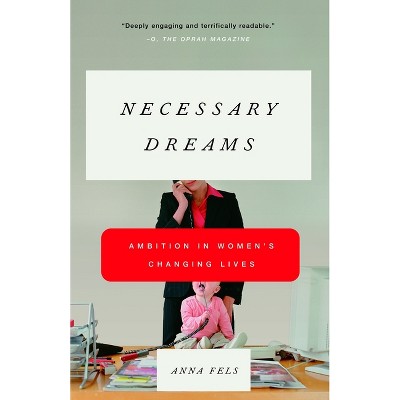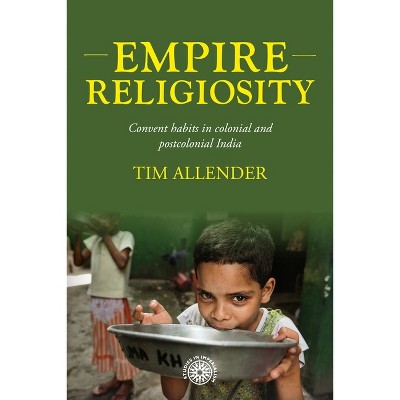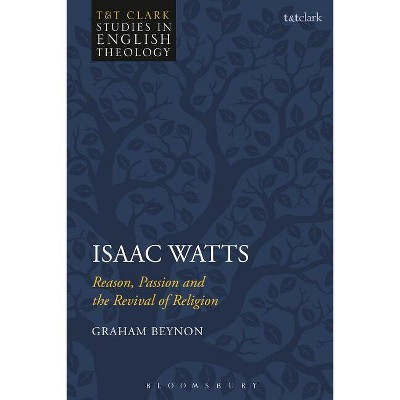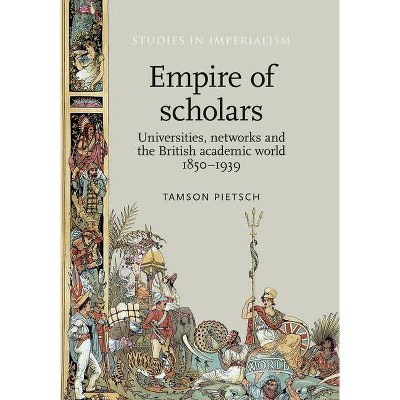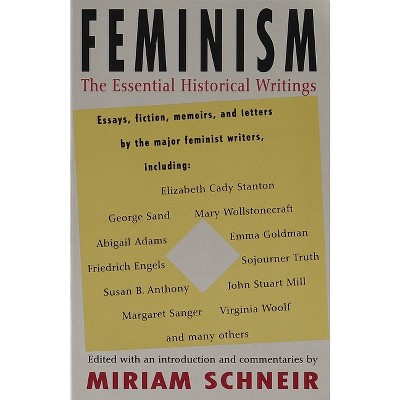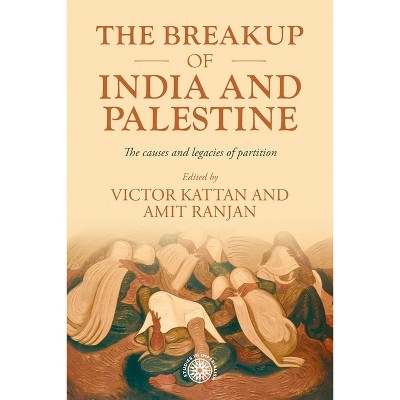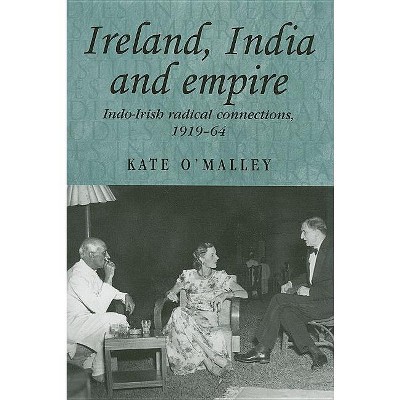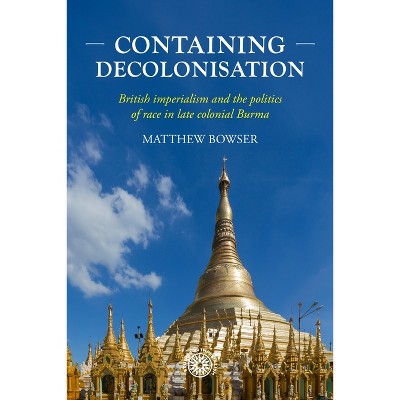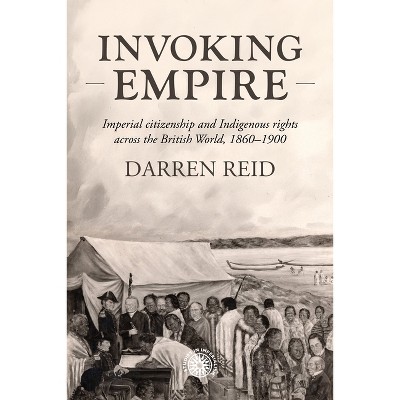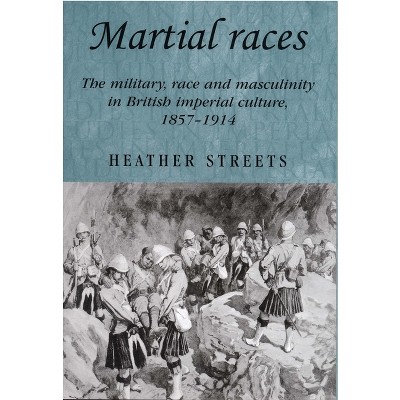Sponsored

Learning Femininity in Colonial India, 1820-1932 - (Studies in Imperialism) by Tim Allender (Paperback)
In Stock
Sponsored
About this item
Highlights
- Provides a unique longitudinal study of women in colonial India, examining their life experiences and how their position changed, both personally and professionally, over more than a century of British rule.
- About the Author: Tim Allender is a Professor at the University of Sydney
- 352 Pages
- History, Asia
- Series Name: Studies in Imperialism
Description
About the Book
Provides a unique longitudinal study of women in colonial India, examining their life experiences and how their position changed, both personally and professionally, over more than a century of British rule.Book Synopsis
Provides a unique longitudinal study of women in colonial India, examining their life experiences and how their position changed, both personally and professionally, over more than a century of British rule.From the Back Cover
This book explores the colonial mentalities that shaped and were shaped by women living in colonial India between 1820 and 1932. Using a broad framework the book examines the many life experiences of these women and how their position changed, both personally and professionally, over this long period of study. Drawing on a rich documentary record from archives in the United Kingdom, India, Pakistan, North America, Ireland and Australia this book builds a clear picture of the colonial-configured changes that influenced women interacting with the colonial state.
In the early nineteenth century the role of some women occupying colonial spaces in India was to provide emotional sustenance to expatriate European males serving away from the moral strictures of Britain. However, powerful colonial statecraft intervened in the middle of the century to racialise these women and give them a new official, moral purpose. Only some females could be teachers, chosen by their race as reliable transmitters of genteel accomplishment codes of European, middle-class femininity. Yet colonial female activism also had impact when pressing against these revised, official gender constructions. New geographies of female medical care outreach emerged. Roman Catholic teaching orders, whose activism was sponsored by piety, sought out other female colonial peripheries, some of which the state was then forced to accommodate. Ultimately the national movement built its own gender thresholds of interchange, ignoring the unproductive colonial learning models for females, infected as these models had become with the broader race, class and gender agendas of a fading raj. This book will appeal to students and academics working on the history of empire and imperialism, gender studies, postcolonial studies and the history of education.Review Quotes
'Allender's attention to the interactions between the colonial state and British women who saw themselves as good citizens of the empire working on behalf of Indian women is a noteworthy contribution to our understanding of this period....Learning Femininity is a must-read for historians of empire and imperialism, Indian history, women's/gender history, gender studies, and the history of education.'
Geraldine Forbes, State University of New York, Oswego, H-Asia, June 2017
Professor Rebecca Rogers, Université Paris Descartes, Paris, in Clio a lu, Clio, Femmes, Genre Histoire, no. 45 (June, 2017) 'This is an impressively detailed and rich study of the history of the education of girls and women in colonial India, based on extensive archival research in a range of localities...I have no hesitation in heartily recommending this rich and well-researched book to all those interested in the history of education in the nineteenth and early twentieth centuries, particularly the history of colonial education.'
Clare Midgley, Sheffield Hallam University, History of Education, February 2017 'In a meticulous study of female education in British India, Tim Allender illuminates the mutual constitution of race and gender over one hundred years of British colonial rule.'
Shefali Chandra, Washington University in St Louis, USA, Women's History Review, November 2016 'Allender's work is a compelling account of evolution, growth and development of female education in colonial India which originated within the framework of the state but went on to develop apparatus operating independent of the state that survived and outlived the colonial machinery.'
Subhasri Ghosh, Asutosh College, University of Calcutta, Kolkata, India, History of Education Review 'Tim Allender's Learning Femininity in Colonial India, 1820-1932 is a carefully researched and constructed book about British gender, class, and race agendas related to the education of girls and women in India. In a departure from much of the writing on this topic, which focuses on the education of Indian girls and women, the author considers the changing influences and networks of state-sponsored education under the East India Company and British Raj. Allender examines the classroom, hospital, and dispensary, spaces where women of different races interacted and carried out their work under the colonial state, to understand how female education reflected the East India Company and the Raj's attitudes toward women.'
Geraldine Forbes, State University of New York, Oswego, H-Asia, June 2017 'Based on a wide array of primary materials from both British and Indian repositories, Allender uses individual case studies along with broad, state-rendered policies to capture the complexities of women's lives on both sides of the colonial divide.'
Roberta Wollons, University of Massachusetts, History of Education Quarterly 'A thoroughly researched book drawing together many strands that analyse social processes spanning a century, between 1820 and 1932, and encompassing significant and productive developments in the field of women's education. In a densely written introduction, the author has extremely competently brought together an extensive range of themes and processes that have a bearing on the subject, principally dealing with the interface between the Raj, its policies and colonial subjects. The book has nine chapters, each of which deals with different aspects of colonial education, focusing on the school and medical care. The chapters have a wealth of detail and make for stimulating reading.'
Vasanthi Raman, Treasurer Centre for Women's Development Studie
About the Author
Tim Allender is a Professor at the University of Sydney